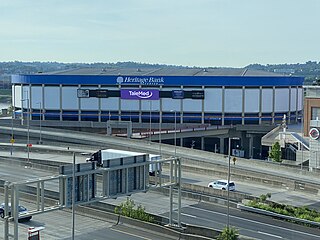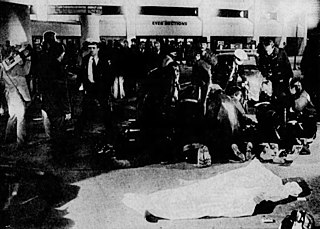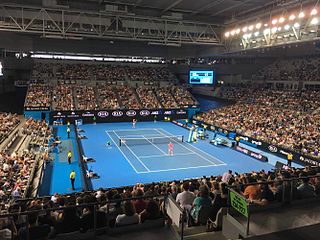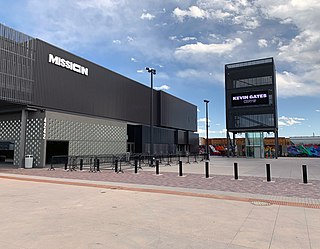
A movie theater, cinema, or cinema hall, also known as a movie house, picture house, picture theater or simply theater, is a business that contains auditoria for viewing films for public entertainment. Most are commercial operations catering to the general public, who attend by purchasing tickets.

A concert is a live music performance in front of an audience. The performance may be carried by a single musician, sometimes then called a recital, or by a musical ensemble, such as an orchestra, choir, or band. Concerts are held in a wide variety and size of settings, from private houses and small nightclubs, dedicated concert halls, amphitheatres and parks, to large multipurpose buildings, such as arenas and stadiums. Indoor concerts held in the largest venues are sometimes called arena concerts or amphitheatre concerts. Informal names for a concert include show and gig.

Heritage Bank Center is an indoor arena located in downtown Cincinnati, next to the Great American Ball Park. It was completed in September 1975 and named Riverfront Coliseum because of its placement next to Riverfront Stadium. In 1997, the facility became known as The Crown, and in 1999, it changed its name again to Firstar Center after Firstar Bank assumed naming rights. In 2002, following Firstar's merger with U.S. Bank, the arena took on the name U.S. Bank Arena and kept that name until 2019.
An event is described as standing-room only when it is so well-attended that all of the chairs in the venue are occupied, leaving only flat spaces of pavement or flooring for other attendees to stand, at least those spaces not restricted by occupancy by fire codes for ingress/egress of crowds. Some venues issue standing-room-only tickets for a reduced cost since it can become uncomfortable to stand through the course of an event. However, some fans prefer standing-room-only tickets, as the crowds that gather can be more active than people who are sitting down for much of the event.

A theater, or playhouse, is a structure where theatrical works, performing arts, and musical concerts are presented. The theater building serves to define the performance and audience spaces. The facility usually is organized to provide support areas for performers, the technical crew and the audience members, as well as the stage where the performance takes place.

The luxury box and club seating constitute the most expensive class of seating in arenas and stadiums, and generate much higher revenues than regular seating. Club ticketholders often receive exclusive access to an indoor part of the venue through private club entrances, to areas containing special restaurants, bars, merchandise stands, and lounge areas of the venue that are not otherwise available to regular ticketholders.

Senator Thomas J. Dodd Memorial Stadium is a stadium in Norwich, Connecticut. It is primarily used for baseball, and since 2010, has been the home of the Norwich Sea Unicorns, who were previously known as the Connecticut Tigers. It was the home field of the Connecticut Defenders minor league baseball team until 2009 when the Defenders announced their move to Richmond, Virginia, to become known as the Richmond Flying Squirrels. It was built in 1995 and has a seating capacity of 6,270. It is named for Eastern Connecticut native Thomas Dodd who was a United States senator and Representative from Connecticut, and the father of U.S. Senator Christopher Dodd.

A music venue is any location used for a concert or musical performance. Music venues range in size and location, from a small coffeehouse for folk music shows, an outdoor bandshell or bandstand or a concert hall to an indoor sports stadium. Typically, different types of venues host different genres of music. Opera houses, bandshells, and concert halls host classical music performances, whereas public houses ("pubs"), nightclubs, and discothèques offer music in contemporary genres, such as rock, dance, country, and pop.
A season ticket, or season pass, is a ticket that grants privileges over a defined period of time.

The Adelaide Entertainment Centre (AEC) is an indoor arena located in the South Australian capital of Adelaide. It is used for sporting and entertainment events. It is the principal venue for concerts, events and attractions for audiences between 1,000 and 11,300.

Riverbend Music Center is an outdoor amphitheater located in Cincinnati, Ohio, along the banks of the Ohio River. It has a capacity of 20,500 and was built for the Cincinnati Symphony Orchestra, to allow them to play in an outdoor venue during the summer months. Its location is directly adjacent to Coney Island water park and Belterra Park. Famed architect and 2012 Driehaus Prize winner Michael Graves designed the building. The venue is owned by the Cincinnati Symphony Orchestra, booked and operated by its subsidiary, Music and Event Management Incorporated (MEMI) and also partners with Live Nation.

A ticket is a voucher that indicates that an individual is entitled to admission to an event or establishment such as a theatre, amusement park, stadium, or tourist attraction, or has a right to travel on a vehicle, such as with an airline ticket, bus ticket or train ticket. An individual typically pays for a ticket, but it may be free of charge. A ticket may serve simply as proof of entitlement or reservation. A ticket may be valid for any seat or for a specific one.
Sandstone Amphitheater, also known as Azura Amphitheater, is an open-air amphitheater located in Bonner Springs, Kansas, United States. It is owned by the unified government of Wyandotte County and Kansas City, Kansas, shares its grounds with the Kansas City Renaissance Festival and National Agricultural Center and Hall of Fame and is located adjacent to the Wyandotte County Park.
In architecture, sightlines are a particularly important consideration in the design of civic structures, such as a stage, arena, or monument. They determine the configuration of such items as theater and stadium design, road junction layout and urban planning. In cities such as London, construction within sightlines is restricted to protect the key views of famous landmarks

The Who concert disaster was a crowd disaster that occurred on December 3, 1979, when English rock band the Who performed at Riverfront Coliseum in Cincinnati, Ohio, United States, and a rush of concert-goers outside the Coliseum's entry doors resulted in the deaths of 11 people.

John Cain Arena is a multi-purpose sports and entertainment arena located within Melbourne Park in Melbourne, Victoria, Australia. It is the second-largest venue and show court for the Australian Open, the first Grand Slam professional tennis tournament held each calendar year. The arena also hosts various other sporting and entertainment events throughout the year.
"In Concert" is a very special episode of the television series WKRP in Cincinnati. Airing as the 19th episode of the second season, it was first broadcast in the United States on February 11, 1980 on CBS, and the concept for the episode was described as "admirably ambitious" by William Beamon, writing in the St. Petersburg Evening Independent before he had viewed the episode.

Daily's Place is an amphitheater in Downtown Jacksonville, Florida. The venue is connected to the south end of EverBank Stadium and shares space with a "flex field" indoor practice facility for the Jacksonville Jaguars. It opened in May 2017 and seats 5,500 spectators. Since 2019, the amphitheater has become nationally known as the home venue for the U.S. professional wrestling promotion All Elite Wrestling (AEW).
The Cadence Bank Amphitheatre is an outdoor amphitheatre within historic Chastain Park in Atlanta, Georgia. The venue, designed by Nelson Brackin, opened in 1944 and is decreed "Atlanta’s Oldest Outdoor Music Venue". The venue attracts more than 200,000 spectators per season.

The Mission Ballroom is a concert venue located in the RiNo neighborhood of Denver, Colorado. The building opened in August 2019 with a capacity of nearly 4,000 patrons. Operated by AEG Presents Rocky Mountain, the venue is viewed as a competitor to the Live Nation operated Fillmore Auditorium.














